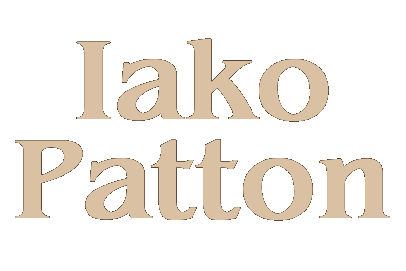Thoughts from a (Kinda) Rhodes Scholar: the last six months.
How does even one begin writing a post like this? Usually, my thoughts stay within my leather-bound notebook, not for the world to read. Yes, I’m that art student.
The last few months have been hectic, to say the least. So, when I returned to Montreal for the holidays, it was a much-needed break from everything that’s transpired. During my first week home, I was able to catch up on every documentary I couldn’t watch this semester. If I did, it would have been detrimental because, just as I predicted, I have a new obsession with the history of New York City. This includes the rise of Times Square via sex work, the gentrification of the Lower East Side, and, of course, the Italian Mafia. I’ve watched Fear City three times, read the US Supreme Court transcripts from the RICO case, and questioned my father about his experience living and working in midtown in the early 1980s. He just happened to witness Paul Castellano’s murder in front of the steak house.
So, you know, just light research.
I also visited my high school, Trafalgar School for Girls. That was strange. I hadn’t stepped foot in that building since 2016. And now, I was being welcomed back in entirely different circumstances. But nothing had really changed; the rotunda still echoed under my platformed footsteps, the third-floor library still had that dusty smell I loved, and a surge of anxiety still flooded my body as I approached the maths offices. It was almost as if the concrete walls remembered the worst of my teenage angst all too well.
Regardless of my internal crisis, reminiscing with so many of my former teachers was humbling. I realized just how big this all was; it was so much bigger than me. I also realized how nice it would be to have a record to look back on, a reflection of just how insane the last couple of months has been. And a log of how absurd the next couple of years will probably be.
Well, I suppose that I should start from the very beginning then—six months ago. On July 14th, I submitted my Rhodes Scholarship screening application to Victoria College, hardly expecting that I would be endorsed. But, then, the email came ten days later. It was just two days before I was scheduled to land at Charles de Gaulle Airport, marking the beginning of my seven-week Paris/Italy trip. That was a completely life-changing experience in and of itself, one that now I recognize as the catalyst for everything that later ensued. Cliché, I know. Regardless, that email, that plane ride: both were seemingly small moments within a larger picture, one that I wouldn't believe if you told me at the time.
In August, I was to study in Siena. Before, my mum, aunt, and I decided to travel. So, we began in Paris. And I’ve been plotting every way to get back since. It’s so rare to feel at home in a place you’ve only just been acquainted with.
I spent hours in the Louvre, the Musée d'Orsay, and the Musée Picasso. I drank wine on the Seine with a view of the Eiffel Tower. I found a copy of Jacob Burckhardt’s The Civilization of the Renaissance in Italy at Shakespeare and Company. And I made the decision that if I didn’t get into grad school or (more likely) couldn't afford it, I would move to Paris and work at Shakespeare and Company—my friends weren’t at all surprised by this.
I think my parents also knew this trip would be a turning point; I probably wasn’t coming home, for a while at least.




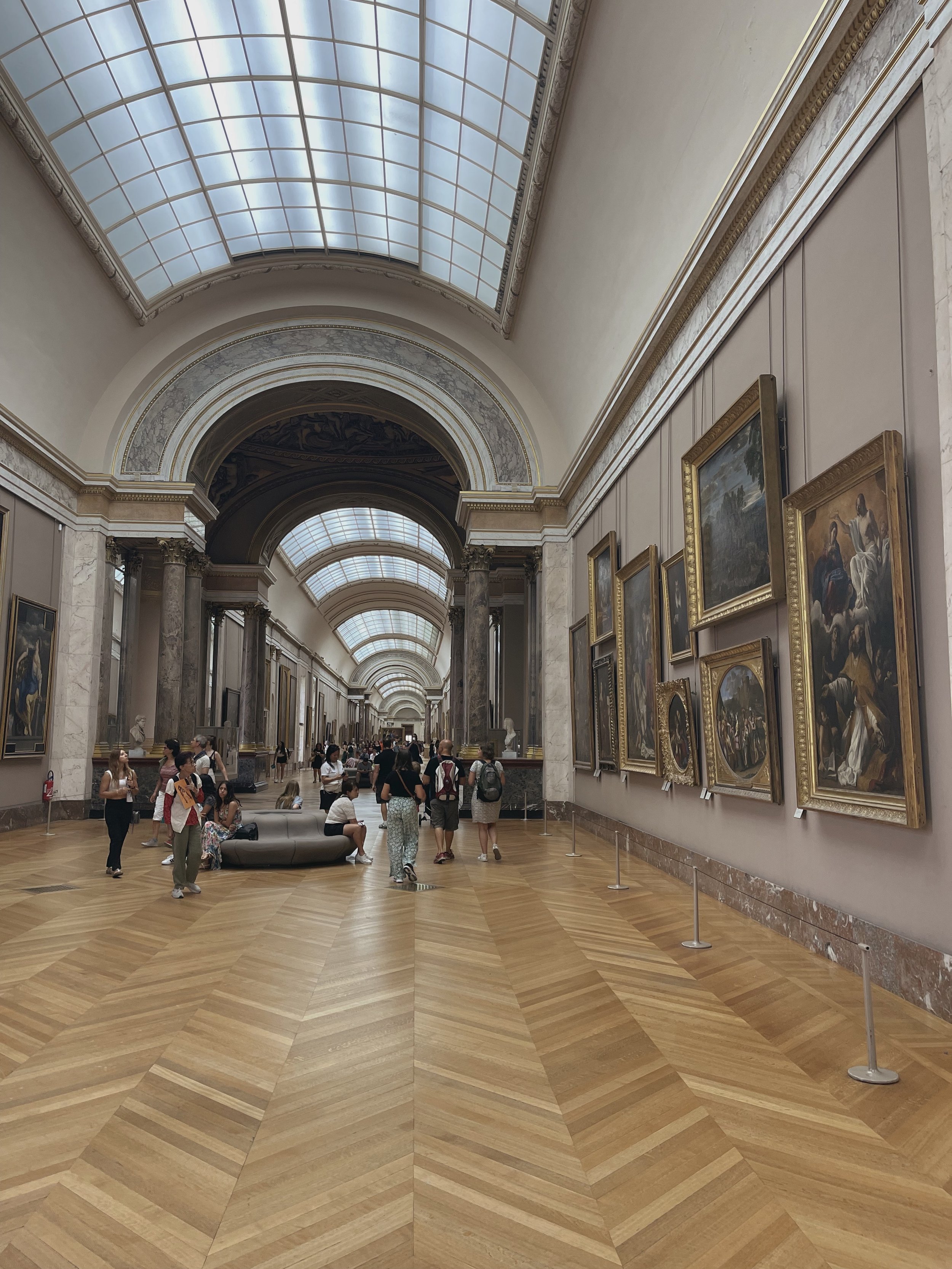












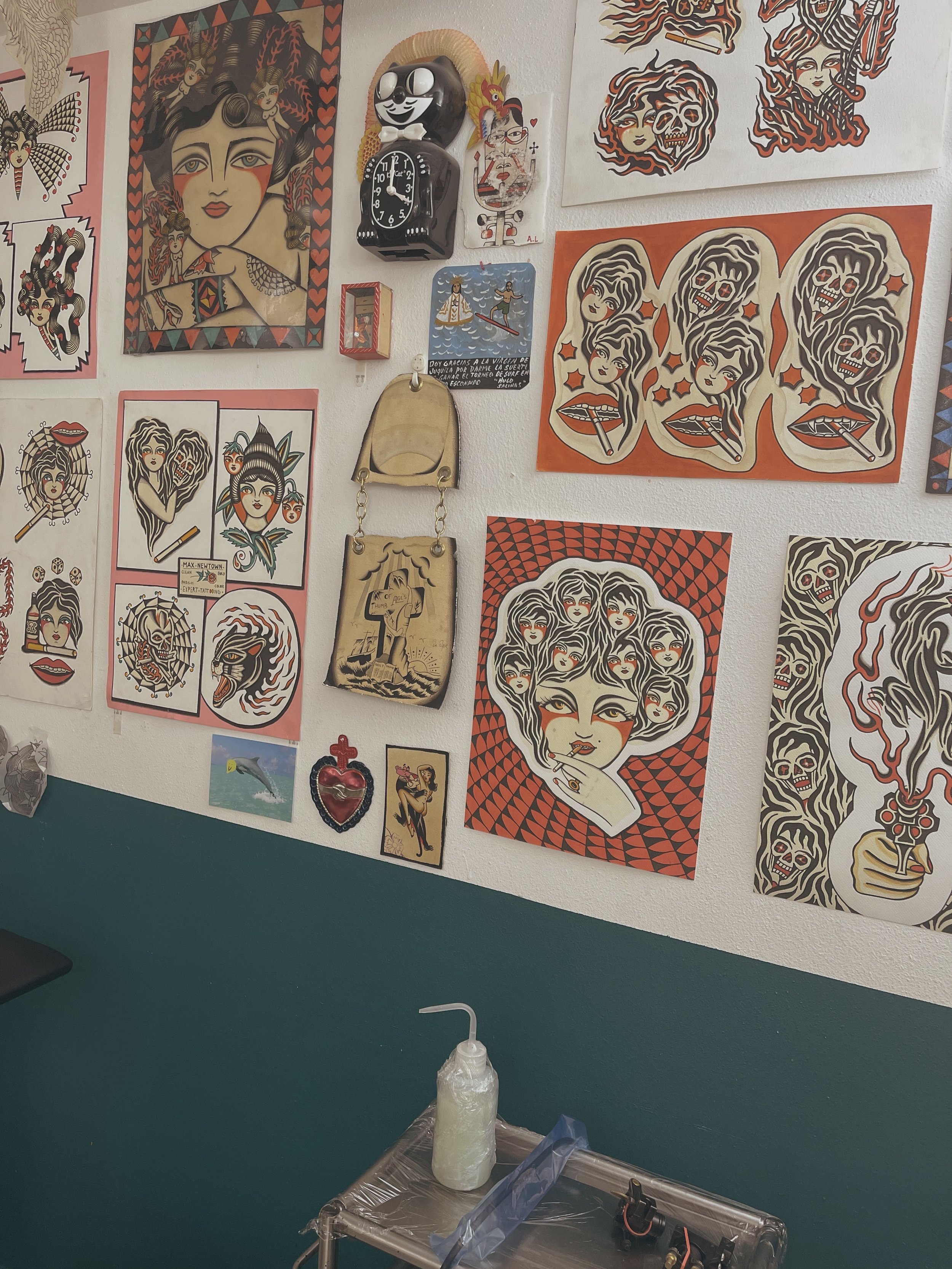




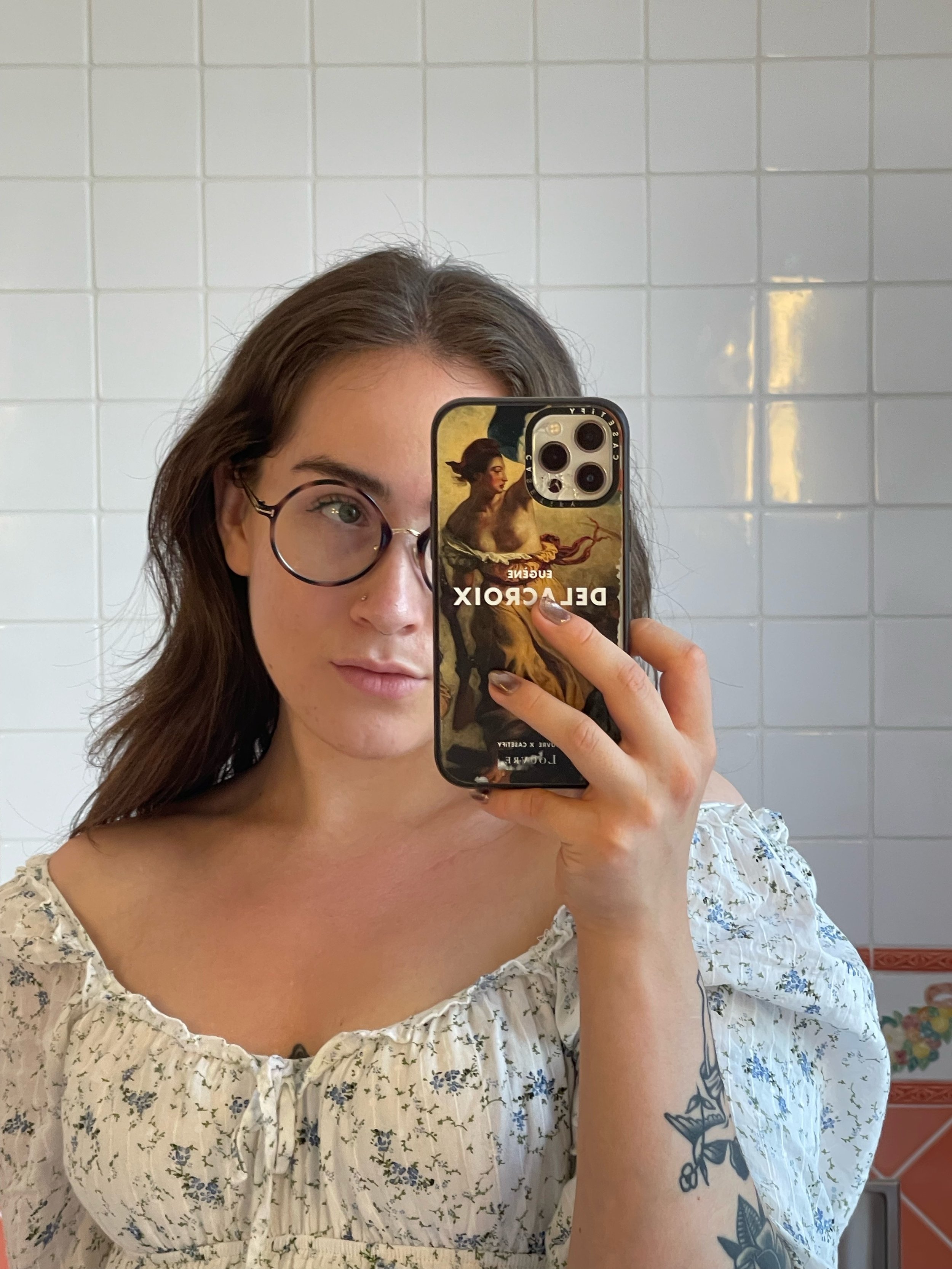









I saw the artwork that started it all. Starry Night Over the Rhône (1888) by Vincent van Gogh. I wanted it to be the perfect experience, so I waited until closing to venture to the top floor of the Musée d'Orsay. I stood in front of that painting for what felt like a lifetime, but, alas, was only an hour. It was… surreal. I’ve always thought it was one of the most beautiful paintings but nothing prepared me to see it in the flesh.
I was first introduced to this masterpiece in a 20th-century art history class in CEGEP, during one of the roughest periods in my life. I had lost my best friend to suicide. Dealing with losing her, I found solace in art. For one, it made me feel closer to her. And two, all the great masters were a little bit insane. Van Gogh was the first artist that I fell in love with, the first artist that I connected with. Starry Night Over the Rhone is the first painting to ever make me cry.
And yes, I cried seeing it at the Musée d'Orsay.
I hadn’t ever felt as connected to an artist as I did with Van Gogh, that is until I discovered Rembrandt—I saw many of his works at the Louvre. I like to say that Rembrandt is the early modern precursor to Van Gogh. Rembrandt walked so Van Gogh could run.
Another one of my favourite memories is getting tattooed by Max Newtown. An artist and an art historian; we talked about the accessibility of art, Parisian tattoo culture, and the Napoleonic Wars. I also gave him a brief lecture on the history of one of the first public museums, the Louvre. I love getting tattooed in different cities and it’s a bonus that tattoo artists are some of the most interesting people to talk with.
Max gave me the most beautiful Cupid tattoo. In the City of Love, I wanted a tattoo to commemorate my love for Love. As a hopeful romantic, it only seemed fitting.























From there, Florence was everything I hoped it would be. And, unfortunately, more. We all must get our hearts broken whilst studying abroad, or are we truly studying abroad? It’s character development.
But I saw Ghiberti’s bronze doors! So, entirely worth the heartbreak in my opinion.
Then, in Rome, I had the Vatican Museums all to myself in the early morning of July 28th. Now, I need you to imagine yourself standing in Raphael’s Stanza della Segnatura completely empty, so empty that you could hear a pin drop. I couldn’t believe where I was, a recurring theme throughout my time abroad.
I found myself staring at the School of Athens and the Disputation, two masterpieces that I had written a paper on just a few months prior. It was unbelievable that I was finally seeing works that I had studied in dim-lit lecture halls for the past five years. They were real, not just projections on a screen. I could see the brushwork, and the glossy finish of oil paint, I could even touch the marbled surface of the greatest architectural achievements. I’ve dedicated my life to art history and this trip, these museums, and the feelings that accompanied standing in front of these works only cemented my affinity.
Studying in Siena was something straight out of a film. I couldn’t believe what I was seeing. Every place we travelled (and I travelled back to) was, dare I say, magical. I couldn’t possibly sum up the five weeks I spent in that Medieval city in a single paragraph, but I will say that I can’t imagine who I would be right now without it.




















Venice. In my first year at UofT, I took Civilization of Renaissance Europe with Professor Kenneth Bartlett, an academic whom I respect immensely. He introduced me to the absolute marvel that is Florence. That class also ignited my love for Venice. And equally, my emotional distress over the knowledge that Venice is a sinking city, that it could be gone in my lifetime and that I may never have the chance to see the Palazzo Ducale. So, when I stepped off the train and glimpsed over the canal in late August, it was just another moment of complete disbelief. I’m certain I cried on every single bridge I crossed—Elizabeth can confirm this statement. She was a witness.
It felt very Romeo and Juliet. And look, I know the play is set in Verona. But Verona was a Venetian state, like, twice, in the Renaissance so I’m technically right in my reference.
All throughout this trip, my Rhodes Scholarship application was at the back of my mind. On the Sunday of my last week in Siena, and in the midst of the aforementioned heartbreak, I had an interview with Victoria College’s President for my endorsement. It was strange and bittersweet. The interview was a reminder that my time in Italy was coming to a close; a chapter I wasn’t ready to finish, frankly.
I didn’t want to leave in the slightest. For one, I had climatized to 35 degrees celsius and sub-25 temperatures felt unbearable. And two, I knew how deeply unhappy I would be leaving my new life behind. I felt like I was just getting settled. I started making friends, I discovered my favourite restaurants, I felt confident in my art historical knowledge of the city, and I knew where to get the best cappuccino—you know, the necessities.
I grew into a version of myself that I was beginning to like. And Siena was becoming home.
Despite getting through each round, inching closer and closer, the Rhodes Scholarship felt so untouchable. With every step, I kept telling myself that this was “it”. That this was the furthest I was going to get. So, I would never get my hopes up. I’ve learned that denial was the easiest defence mechanism; if I denied the process, then the inevitable outcome of rejection would be easier to (not) process. Because it felt impossible that I would be a Rhodes Scholar. An Indigenous art historian? That surely wasn’t going to happen. Who on earth would let that happen?
Yet, there I was, in the middle of a guest lecture hosted by the Department of Art History on a Wednesday in November. I just happened to look down at my phone at the very moment an email appeared. The subject line read: Congratulations! You have been selected for an interview with the Ontario Rhodes Scholarship Selection Committee. It felt like the wind was knocked out of me. My hands began sweating and I passed the phone to my friend, Charlotte. She didn’t even know that I had applied. In fact, no one knew that I applied besides my parents, Alex (my best friend from high school), and Tamara (my emotional support and HASA vice president). I felt like the more people that knew, the larger the body of people that I would inevitably disappoint. The pressure was immense.
Nevertheless, I confirmed my interview for the following Saturday. Still, there was a split second where I thought, “I can’t do this. I can’t reply”.


































My first mock interview was a humbling experience to say the very least. I realized just how ill-prepared I was. Every question felt so personal and completely out of left field; I also couldn’t formulate a proper, concise answer to any of them. I panicked. I froze. But I wanted to prove myself wrong. I could do this.
I would be lying if I said it was just an internal drive. Through elementary school, high school, CEGEP, all the competitive sports, and leadership positions I’ve held, there’s been so many instances where I’ve been underestimated. Undercut. Every rejection, every loss, and every criticism has made me doubt myself whilst simultaneously fueling me. I wanted to prove everyone else wrong too.
I get the stubbornness of my father. And watching too many inspirational CBUM gym videos.
After my first mock interview, all I did was prepare during Reading Week. I quite literally lived and breathed this scholarship. I couldn’t think of anything else even if I tried (and I tried). I put everything else aside, schoolwork included. I did mock interview after mock interview. Over and over, I was told that the Rhodes interview questions were to be the hardest I would ever face, so I braced for the worst. I prepared answers to how I would amend Canadian immigration policy, I compiled solutions to the war on Ukraine, I organised arguments against the overturning of Roe v. Wade, and I solidified my opinions on Brexit. I had never thought so much about myself, my motives, and why I wanted to study art history before. And most importantly, how I would change the world through art history. In that single week, I was forced to learn about myself in ways that I hadn’t before. If I wasn’t to be awarded the Rhodes Scholarship, it would have been worth it just for that.
It happened all so quickly. I walked into that interview, not knowing what to expect. And I walked out even less sure.
I sauntered home and my entire day was spent waiting for the phone call to inform me of the outcome. It was excruciating. When I couldn’t binge Gilmore Girls any longer, I cleaned my entire apartment. I was too anxious to even consider watching the next episode, which was titled The Big One. It’s the episode where Rory gets rejected from Harvard. It may have been character development for Rory Gilmore, but I refused that arc.
It was 7:50 pm. I decided I couldn’t wait any longer. I was going to meet my friends for dinner. I was tying my shoes at 7:55. Grabbing my keys at 7:56. Walking out the door at 7:57. Choosing a Spotify playlist at 7:58. I was stepping into the elevator when my phone rang at 7:59.
My apartment corridor has notoriously spotty cellphone reception…. Cue me running from the elevator, bumping into a neighbour, and tripping over her dog. After multiple failed calls, I stumbled into my pitch-black apartment and was the one to return the call. Throughout the history of the Rhodes Scholarship, I can’t help but wonder if another recipient has called the selection committee for their decision. But, more likely, I am just clumsy in every aspect of my life.
When I answered, out of breath and shaking, all I heard on the other line was “Iako, by the way, you’re on speaker… Congratulations!” All I could say was, “oh my god”. I blacked out through most of the call, but I will forever remember what Brian Rolfes told me.
“Now, go off and change the world.” And I said, trying not to give away the fact that I was crying, “that’s all I ever aimed to do”.
The Rhodes Scholarship is a funny thing.
Every applicant knows that the Rhodes Scholarship is a big deal. But you don’t truly comprehend just how big that deal is until you’re on the other side. The press, the social media, the messages, the emails, I couldn’t open my phone for weeks. I had no idea how people found my email or my phone number. That’s what I didn’t anticipate. It was overwhelming. I was just barely surviving midterms. And two weeks later, I was drowning in multiple papers worth half of my final grade.
Once again, I was in my little pressure cooker. But, this time, the lid was about to burst.
Whilst I was holed up in the Art History Department, descending into utter madness, everyone around me consumed the perfectly manicured image plastered on the front page of, what seemed like, every major news outlet.

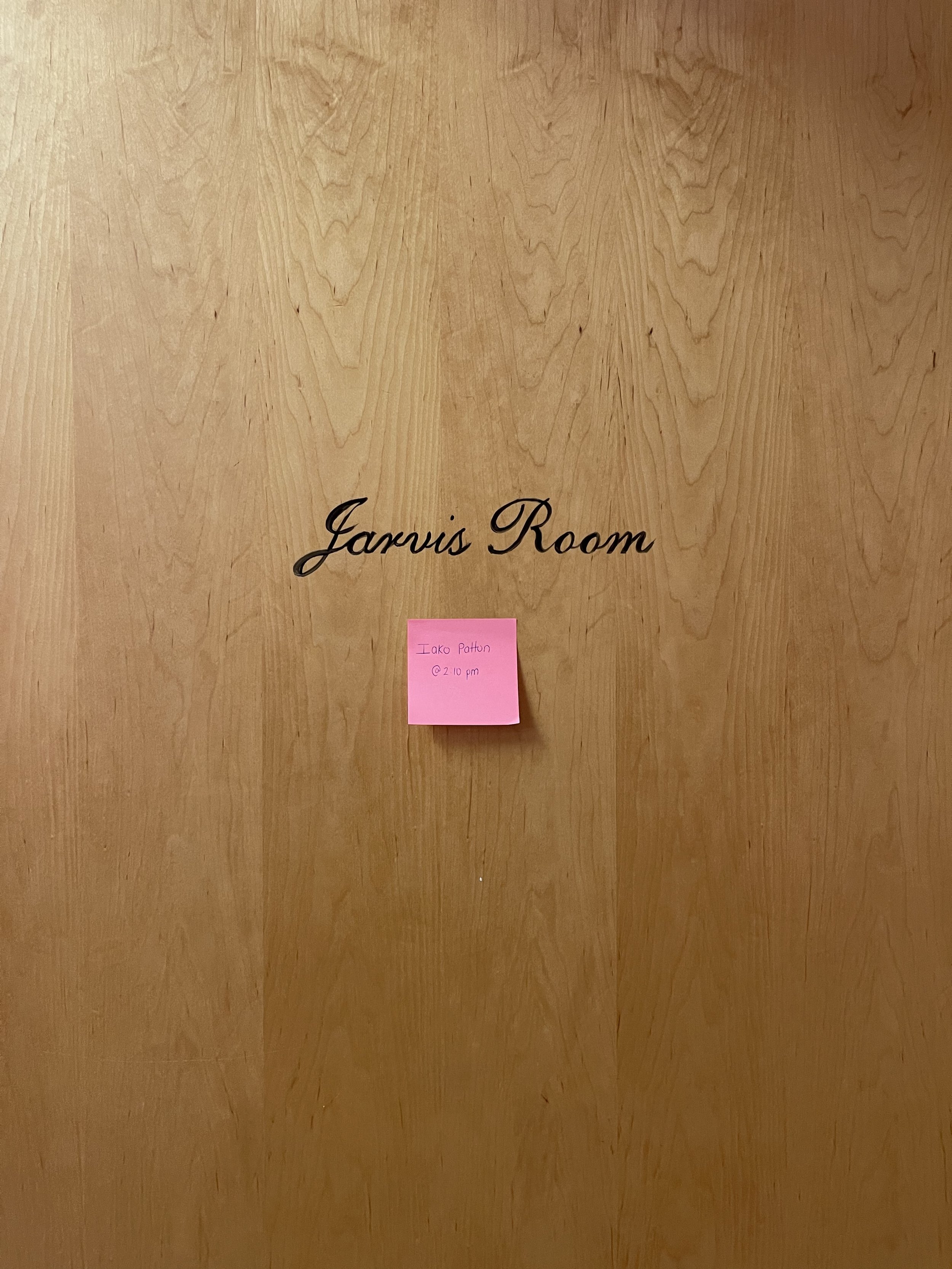
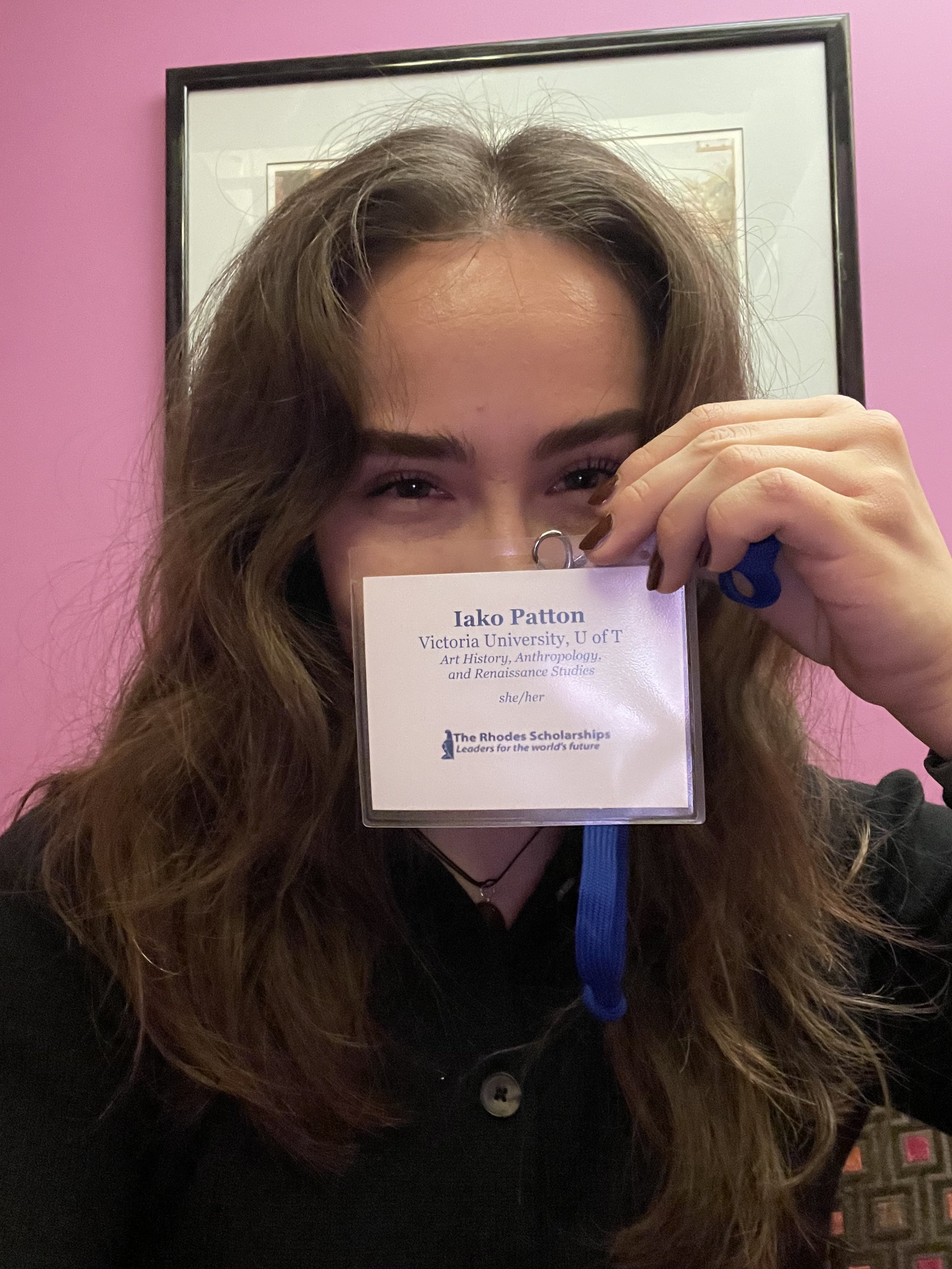
It was a lot. And all I could hear was “… she’s joining the ranks of Bill Clinton” and I was like, “bro, I haven’t even submitted my application to Oxford yet”.
So, I suppose that brings me to my Oxford application. See, the Rhodes Scholarship is just the first big hurdle. Getting into Oxford is the next, perhaps, larger hurdle—one that I feel even less equipped for. That’s most likely the imposter syndrome speaking; it doesn't ever go away. You only learn to deal with it (so I’ve been told).
I submitted my applications two days before Christmas. Afterwards, I slept for nearly ten hours. It felt good, yet utterly horrifying. The Rhodes Committee decided the trajectory of my future and now the Oxford History Department will cement that decision.
Even though my application is out in the ether, I still haven’t watched the Gilmore Girls episode where Rory gets rejected from Harvard. The wariness doesn’t ever go away (that I do know).
